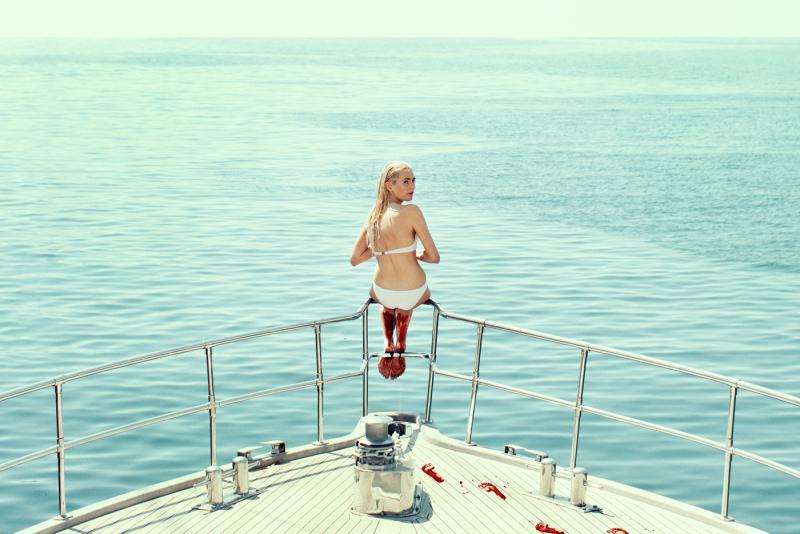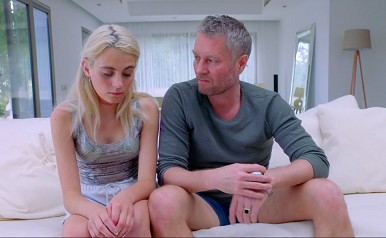Holiday review - harrowing Danish drama about misogyny | reviews, news & interviews
Holiday review - harrowing Danish drama about misogyny
Holiday review - harrowing Danish drama about misogyny
A drug lord's new girlfriend makes the mistake of befriending another man

The English-language drama Holiday, Danish filmmaker Isabella Eklöf’s feature debut, is an anthropological study of the corrosive effects of absolute male power and calcified misogyny.
After deplaning at an airport that serves the Turkish Riviera and coaching into the port town of Bodrum, the protagonist Sascha (Sonne), a fragile woman of about 22, crouches on her feet and performs an anguished title-sequence dance that’s abstracted from the narrative. Never again in the film is this passive creature so vigorous. Only on seeing what befalls her can we interpret the dance. It’s either an expression of repressed rage or a desperate plea for deliverance.
Sascha checks into a hotel and smilingly examines herself posing in a revealing swimsuit, indicating that her body, her gentle face, and her (terrible) blonde dye job are the only currency she has that she or anyone else recognises. She meekly confesses to a heavy who picks her up in a car that she’s overspent her allowance by 300 euros. “How fucking old are you? Pretty girls, everything’s for free….Just a little smile, maybe sucking off the right guy. That’s the way the world works, huh?,” he says before slapping her twice. She hands over 9,600 euros to him. He’s not her pimp, however, but a courier working for her new boyfriend, Michael (Lai Yde, pictured above right), a coarse, heavy-set minor drug lord in his forties who’s grudgingly indulging a group of friends and their children with a luxury vacation. It’s unclear what these people are to Michael, except for a lackey, Musse (Adam Ild Ruhweder), whom he beats up for nearly bungling a drug deal. The haplessly immature Sascha has more affinity with the kids than the other adults. After Michael spikes her drink with a sleeping draught at a party, she becomes the rag doll he apathetically mauls and rearranges on their bed – a scene that likens her to the sedated prostitute in Julia Leigh’s Sleeping Beauty (2011).
She hands over 9,600 euros to him. He’s not her pimp, however, but a courier working for her new boyfriend, Michael (Lai Yde, pictured above right), a coarse, heavy-set minor drug lord in his forties who’s grudgingly indulging a group of friends and their children with a luxury vacation. It’s unclear what these people are to Michael, except for a lackey, Musse (Adam Ild Ruhweder), whom he beats up for nearly bungling a drug deal. The haplessly immature Sascha has more affinity with the kids than the other adults. After Michael spikes her drink with a sleeping draught at a party, she becomes the rag doll he apathetically mauls and rearranges on their bed – a scene that likens her to the sedated prostitute in Julia Leigh’s Sleeping Beauty (2011).
Failing to understand that her kept-woman status and its rewards – sloth, jewellery, sunshine – make her Michael’s property, Sascha befriends a Dutchman she meets in an ice-cream store. The genial, non-materialistic nomad Thomas (Thijs Römer) is everything Michael isn’t. Sascha is outwardly naïve in associating with a guy who’s interested in her sexually, but unconsciously she’s seeking a rescuer. Michael marks his territory by raping her, as casually as he battered Musse, and throws in an extra measure of defilement. Eerily, she accepts it as the price she must pay for her cushy lifestyle: “holiday” refers as much to her day-to-day existence as to the Turkish jaunt. But the degree to which she has been brutalised and corrupted has unexpected consequences for Thomas, this fairy tale’s feckless Prince Charming.
Holiday is an allegory of relationships between trusting women and controlling men who abuse their power, and it makes for salutary viewing. Ironically gorgeous in its sunlit setting, it was filmed by cinematographer Nadim Carlsen in the coldly objective style – reliant on medium-close master shots – of the Austrian director Ulrich Seidl. The sardonic, audience-implicating approach of Seidl’s countryman Michael Haneke also comes to mind. The rape scene, and another in which Michael degrades Sascha as a whore, suggests Eklöf is targeting the pernicious integration of pornographic imagery into modern lives. Though Holiday is more explicit than Jennifer Kent's The Nightingale, another 2018 movie that depicts rape as a means of oppression, it has so far generated less controversy than the Australian historical drama, perhaps because the latter includes multiple rapes.
It’s worth noting that Sonne wasn’t physically abused during the making of Holiday (a prosthesis was used for Michael’s penis). That doesn’t detract from the courage she showed in playing Sascha.
The future of Arts Journalism
You can stop theartsdesk.com closing!
We urgently need financing to survive. Our fundraising drive has thus far raised £49,000 but we need to reach £100,000 or we will be forced to close. Please contribute here: https://gofund.me/c3f6033d
And if you can forward this information to anyone who might assist, we’d be grateful.

Subscribe to theartsdesk.com
Thank you for continuing to read our work on theartsdesk.com. For unlimited access to every article in its entirety, including our archive of more than 15,000 pieces, we're asking for £5 per month or £40 per year. We feel it's a very good deal, and hope you do too.
To take a subscription now simply click here.
And if you're looking for that extra gift for a friend or family member, why not treat them to a theartsdesk.com gift subscription?
more Film
 theartsdesk Q&A: filmmaker Dag Johan Haugerud on sex, love, and confusion in the modern world
The writer-director discusses first-love agony and ecstasy in 'Dreams', the opening UK installment of his 'Oslo Stories' trilogy
theartsdesk Q&A: filmmaker Dag Johan Haugerud on sex, love, and confusion in the modern world
The writer-director discusses first-love agony and ecstasy in 'Dreams', the opening UK installment of his 'Oslo Stories' trilogy
 Oslo Stories Trilogy: Dreams review - love lessons
First love's bliss begins a utopian city symphony
Oslo Stories Trilogy: Dreams review - love lessons
First love's bliss begins a utopian city symphony
 Blu-ray: Two Way Stretch / Heavens Above!
'Peak Sellers': two gems from a great comic actor in his prime
Blu-ray: Two Way Stretch / Heavens Above!
'Peak Sellers': two gems from a great comic actor in his prime
 Late Shift review - life and death in an understaffed Swiss hospital
Petra Volpe directs Leonie Benesch in a compelling medical drama
Late Shift review - life and death in an understaffed Swiss hospital
Petra Volpe directs Leonie Benesch in a compelling medical drama
 The Naked Gun review - farce, slapstick and crass stupidity
Pamela Anderson and Liam Neeson put a retro spin on the Police Squad files
The Naked Gun review - farce, slapstick and crass stupidity
Pamela Anderson and Liam Neeson put a retro spin on the Police Squad files
 theartsdesk Q&A: actor Lars Eidinger on 'Dying' and loving the second half of life
The German star talks about playing the director's alter ego in a tormented family drama
theartsdesk Q&A: actor Lars Eidinger on 'Dying' and loving the second half of life
The German star talks about playing the director's alter ego in a tormented family drama
 The Fantastic Four: First Steps review - innocence regained
Marvel's original super-group return to fun, idealistic first principles
The Fantastic Four: First Steps review - innocence regained
Marvel's original super-group return to fun, idealistic first principles
 Dying review - they fuck you up, your mum and dad
Family dysfunction is at the heart of a quietly mesmerising German drama
Dying review - they fuck you up, your mum and dad
Family dysfunction is at the heart of a quietly mesmerising German drama
 theartsdesk Q&A: director Athina Rachel Tsangari on her brooding new film 'Harvest'
The Greek filmmaker talks about adapting Jim Crace's novel and putting the mercurial Caleb Landry Jones centre stage
theartsdesk Q&A: director Athina Rachel Tsangari on her brooding new film 'Harvest'
The Greek filmmaker talks about adapting Jim Crace's novel and putting the mercurial Caleb Landry Jones centre stage
 Blu-ray: The Rebel / The Punch and Judy Man
Tony Hancock's two film outings, newly remastered
Blu-ray: The Rebel / The Punch and Judy Man
Tony Hancock's two film outings, newly remastered
 The Ballad of Suzanne Césaire review - a mysterious silence
A black Caribbean Surrealist rebel obliquely remembered
The Ballad of Suzanne Césaire review - a mysterious silence
A black Caribbean Surrealist rebel obliquely remembered
 Harvest review - blood, barley and adaptation
An incandescent novel struggles to light up the screen
Harvest review - blood, barley and adaptation
An incandescent novel struggles to light up the screen

Add comment